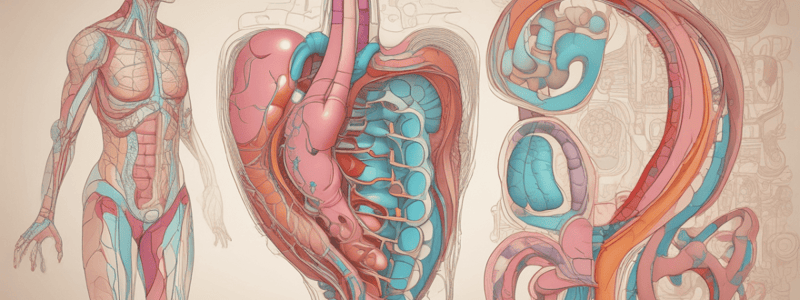Podcast
Questions and Answers
What is the primary function of the liver in the process of digestion?
What is the primary function of the liver in the process of digestion?
- To monitor blood components, metabolize products, and store nutrients (correct)
- To absorb nutrients from the small intestine
- To excrete waste products directly into the urinary system
- To break down proteins into amino acids
What is the role of the urinary system in regulating blood volume and blood pressure?
What is the role of the urinary system in regulating blood volume and blood pressure?
- By adjusting calcium ion levels in the blood
- By altering the quantity of sodium ions in the blood
- By releasing erythropoietin hormone
- By altering the volume of water lost in urine (correct)
What is the term for the state in which the body maintains a stable internal environment despite changes in the external environment?
What is the term for the state in which the body maintains a stable internal environment despite changes in the external environment?
- Homeostasis (correct)
- Metabolism
- Detoxification
- Regulation
What is the equation that illustrates the concept of balance in the body?
What is the equation that illustrates the concept of balance in the body?
What is the role of the urinary system in maintaining blood pH?
What is the role of the urinary system in maintaining blood pH?
What is the term for a situation in which solutes or water enter the plasma faster than they exit?
What is the term for a situation in which solutes or water enter the plasma faster than they exit?
What nutrients does the urinary system help to conserve?
What nutrients does the urinary system help to conserve?
What is the role of the adrenal glands in the urinary system?
What is the role of the adrenal glands in the urinary system?
What is the primary function of the hepatic veins?
What is the primary function of the hepatic veins?
What is the term for the process by which the kidneys regulate solute and water content in the plasma?
What is the term for the process by which the kidneys regulate solute and water content in the plasma?
What is the primary function of the ureters in the urinary system?
What is the primary function of the ureters in the urinary system?
How does the urinary system help to maintain homeostasis?
How does the urinary system help to maintain homeostasis?
What is the primary function of the renal corpuscle in the nephron?
What is the primary function of the renal corpuscle in the nephron?
What is the term for the urine that leaves the glomerulus and is modified as it moves through the nephron?
What is the term for the urine that leaves the glomerulus and is modified as it moves through the nephron?
What is NOT regulated by the kidneys and nephrons?
What is NOT regulated by the kidneys and nephrons?
What is the functional unit of the renal process where modifications are undertaken?
What is the functional unit of the renal process where modifications are undertaken?
What is the purpose of the renal tubules?
What is the purpose of the renal tubules?
What is the term for the urine that leaves the nephron and flows through the collecting duct and into the bladder?
What is the term for the urine that leaves the nephron and flows through the collecting duct and into the bladder?
Flashcards are hidden until you start studying
Study Notes
Liver and Digestion
- The liver produces bile, essential for emulsifying fats and aiding enzymatic action during digestion.
- It metabolizes nutrients absorbed from the digestive tract, processing carbohydrates, proteins, and fats.
Urinary System and Homeostasis
- Regulates blood volume and pressure by adjusting the amount of water excreted or retained.
- Maintains blood pH balance by excreting hydrogen ions and reabsorbing bicarbonate as needed.
- Helps to conserve essential nutrients, including glucose and amino acids, from being lost in urine.
Internal Environment Stability
- Homeostasis refers to the state in which the body maintains a stable internal environment amidst external changes.
- This includes thermoregulation, pH balance, and fluid equilibrium.
Concept of Balance in the Body
- The equation for balance in the body can be expressed as Intake - Output = Change in Storage.
- This concept emphasizes maintaining equilibrium between what enters and exits the body.
Urinary System Dynamics
- A situation where solutes or water enter plasma faster than they exit is termed fluid overload.
- The adrenal glands release hormones like aldosterone, influencing kidney function and therefore fluid retention or excretion.
Renal Structures and Functions
- The primary function of the hepatic veins is to transport deoxygenated blood from the liver back to the heart.
- The renal corpuscle in the nephron functions as a filtration unit, capturing blood and beginning urine formation.
- The renal tubules carry out modification of filtrate, adjusting solute concentrations and volume of urine.
Urine Formation and Flow
- Urine that exits the glomerulus and is modified through the nephron is referred to as filtrate.
- The final urine that leaves the nephron flows through the collecting duct before being stored in the bladder.
Kidney Regulation
- Kidneys do not regulate blood glucose levels; this is managed primarily by the pancreas.
- The nephron is the functional unit of the kidney, where filtration and modification occur to produce urine.
Ureters and Urinary System Functions
- The primary function of ureters is to transport urine from the kidneys to the bladder.
- The urinary system plays a crucial role in maintaining homeostasis by regulating electrolyte balance, fluid levels, and waste removal.
Studying That Suits You
Use AI to generate personalized quizzes and flashcards to suit your learning preferences.




